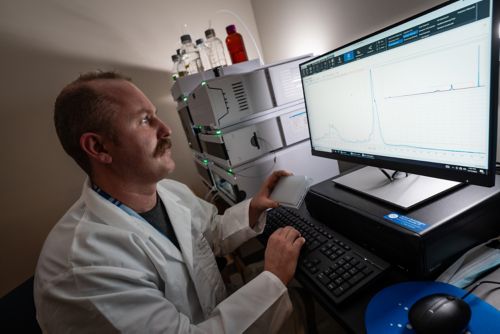St. Jude Family of Websites
Explore our cutting edge research, world-class patient care, career opportunities and more.
St. Jude Children's Research Hospital Home

- Fundraising
St. Jude Family of Websites
Explore our cutting edge research, world-class patient care, career opportunities and more.
St. Jude Children's Research Hospital Home

- Fundraising
Elizabeth H. Kellogg Lab
Studying genome engineering, organization and architecture.
About the Kellogg Lab
Genome organization plays a major role in maintaining normal cellular function, controlling gene expression, DNA replication and shaping genome evolution. Our laboratory is interested in understanding the molecular processes capable of rearranging the genome and potentially harnessing these processes in translational studies.

Our research summary
We are interested in understanding the fundamental molecular mechanisms of processes capable of reorganizing a genome. Our laboratory is also interested in visualizing nuclear processes to gain further insight into this important molecular process.
Transposon biology
Transposons are DNA sequences capable of moving to different locations on the genome. These mobile genetic elements can either positively or negatively affect the genome due to their ability to modulate gene expression and/or recombination events.

Our laboratory studies a specific family of transposons which use guide RNA to specifically direct the insertion large pieces of DNA into a particular location on the genome. These transposons, called CRISPR-associated transposons, are found in bacteria and have the potential to be used as a scientific tool for genome modification.
We use a variety of strategies, such as molecular biology, biochemistry, high-throughput assays, cryogenic electron microscopy and computational approaches to better understand the structure of these mobile elements and how they achieve such specificity during transposition.
In addition to CRISPR-associated transposons, we study other transposon systems as well as other molecular processes that modify how the genome is read or written.
Understanding nuclear processes
We are interested in using a variety of scientific methods to visualize processes inside the nucleus. Our goal is to gain understanding of the biological functions occurring inside this important organelle.
Learn more
- Elizabeth H. Kellogg receives the 2023 Margaret Oakley Dayhoff Award. The award is given to a woman who holds very high promise or has achieved prominence while developing the early stages of a career in biophysical research.
- Researchers visualize structures of a CRISPR–Cas complex that steers invading DNA to sites in the bacterial genome that suit both the invader and the host.
Publications
Contact us
Elizabeth Kellogg, PhD
Associate Member
Department of Structural Biology
MS 311, M6428
St. Jude Children's Research Hospital
Follow Us

Memphis, TN, 38105-3678 USA GET DIRECTIONS